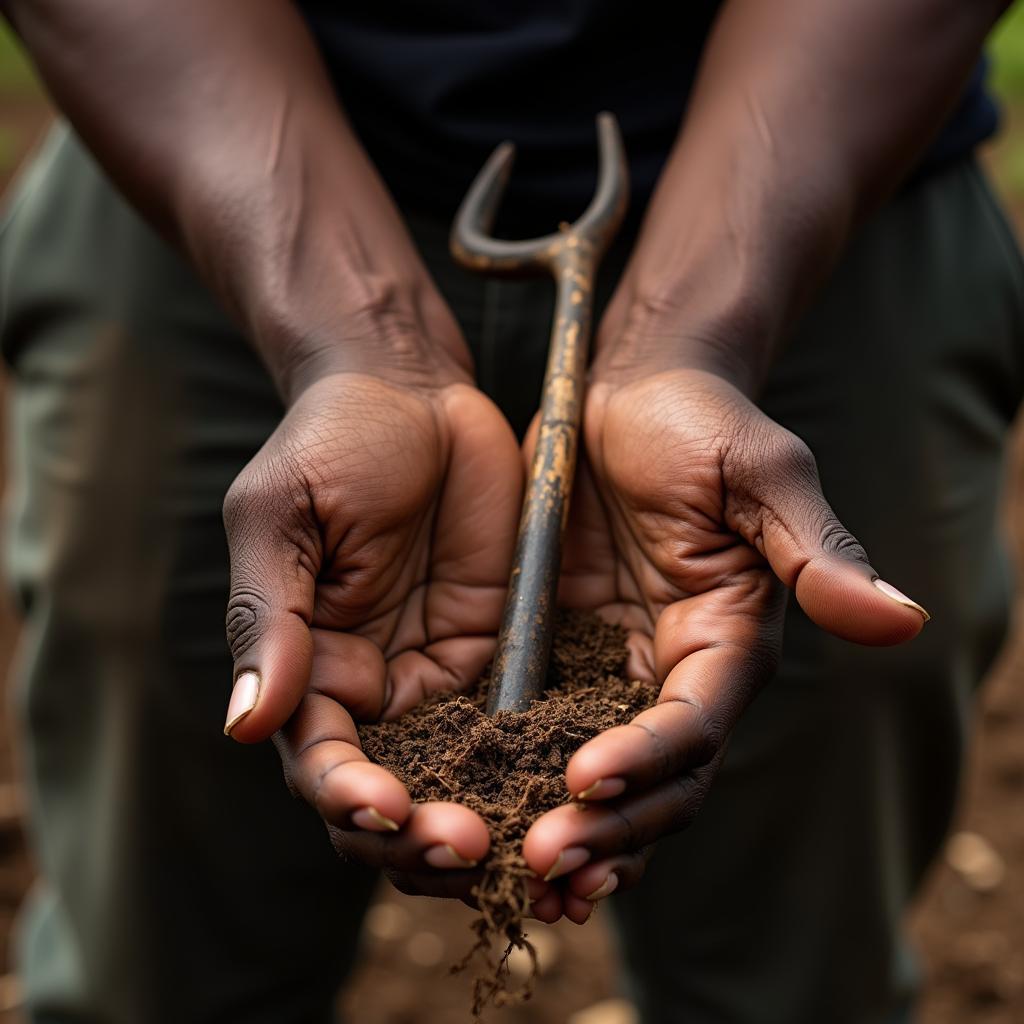The Story Told by African American Hands
African American Hands tell a powerful story, a narrative woven through generations of resilience, creativity, and cultural richness. These hands, marked by history, speak volumes beyond words, expressing joy, sorrow, strength, and hope. They are a testament to the enduring spirit of a people. Let’s explore the profound significance embedded within the narrative of African American hands.
The Legacy of Labor in African American Hands
For centuries, African American hands have been instrumental in shaping the landscape of America. From the forced labor of enslaved ancestors who toiled in fields of cotton and tobacco to the skilled craftsmanship of blacksmiths, carpenters, and seamstresses, these hands have built, cultivated, and created. They represent not just physical labor, but also the unwavering determination to survive and thrive despite adversity. The calloused hands of sharecroppers and the nimble fingers of quilters alike tell a story of perseverance and ingenuity.
These hands nurtured families and communities, passing down traditions, skills, and stories from one generation to the next. They held the tools that forged a new life in a new land, while also clinging to the cultural heritage of their African roots. The strength and resilience embodied in these hands are a constant reminder of the vital role African Americans have played in the nation’s history.
What stories do these hands tell? They tell stories of resilience, of overcoming hardship, of building a life from the ground up. They are a testament to the indomitable spirit of a people who refused to be broken.
 African American Hands: A Legacy of Labor
African American Hands: A Legacy of Labor
Expressing Identity Through African American Hands
African American hands have also been powerful instruments of cultural expression. From the rhythmic clapping and swaying in gospel music to the intricate movements of traditional African dances, these hands communicate a rich tapestry of cultural heritage. Think of the expressive gestures in storytelling, the soulful strumming of a banjo, or the powerful symbolism of African American praying hands. These hands speak a language understood across generations, connecting individuals to their ancestors and their shared history.
Beyond their physicality, African American hands also symbolize connection and community. The act of holding hands, embracing, and offering support highlights the importance of unity and togetherness within the African American community. African American couple holding hands represents this connection and the strength found in shared experiences. These gestures of affection and solidarity are a vital part of the social fabric, reinforcing bonds of kinship and mutual support.
How do African American hands express identity? Through music, dance, art, and gestures, these hands communicate a unique cultural heritage, connecting individuals to their past and present.
African American Hands in Modern Times
Today, African American hands continue to shape the world in countless ways. They are the hands of artists, athletes, scientists, entrepreneurs, and leaders in every field imaginable. They hold the pens that write groundbreaking literature, the scalpels that perform life-saving surgeries, and the tools that build innovative technologies. They continue to build, create, and inspire, carrying forward the legacy of resilience and creativity that has defined generations.
From the political activism that fights for social justice to the artistic creations that challenge conventional norms, African American hands continue to push boundaries and create positive change. They are a testament to the ongoing struggle for equality and the enduring power of the human spirit. Learning about African American heritage food is another way to connect with this rich culture. And knowing traditional African American greetings demonstrates respect and understanding.
What is the significance of African American hands today? They continue to shape the world, driving innovation, creating art, and advocating for social justice. They represent the ongoing journey of a people towards a brighter future.
 African American Hands in Modern Times
African American Hands in Modern Times
Conclusion
African American hands tell a story of resilience, creativity, and cultural richness that spans centuries. These hands have shaped the landscape of America, expressed a unique cultural identity, and continue to inspire and create positive change in the world. By understanding the significance of these hands, we gain a deeper appreciation for the contributions of African Americans to our shared human story. Remember, African American hands are more than just physical appendages; they are a powerful symbol of a people’s journey, their struggles, and their triumphs.
FAQ
- What is the historical significance of African American hands?
- How have African American hands been used to express cultural identity?
- What role do African American hands play in modern society?
- What can we learn from the story of African American hands?
- How can we celebrate the legacy of African American hands?
- Where can I find more resources about African American history and culture?
- What are some ways to support African American communities and artists?
Scenarios for Common Questions:
-
Scenario: Someone asks about the meaning behind clasped hands in African American culture.
-
Response: Clasped hands can symbolize unity, solidarity, and prayer, reflecting the importance of community and faith.
-
Scenario: A student is researching the role of African American hands in art and literature.
-
Response: Many artists and writers have explored the symbolism of hands to represent strength, resilience, and cultural identity.
Further Exploration
For more insights into African American culture, consider exploring topics such as African American music, literature, and art. You can also find valuable information about African American history and traditions online and in libraries.
Contact Us
For further assistance, please contact us at Phone: +255768904061, Email: kaka.mag@gmail.com, or visit us at Mbarali DC Mawindi, Kangaga, Tanzania. We have a 24/7 customer service team.
